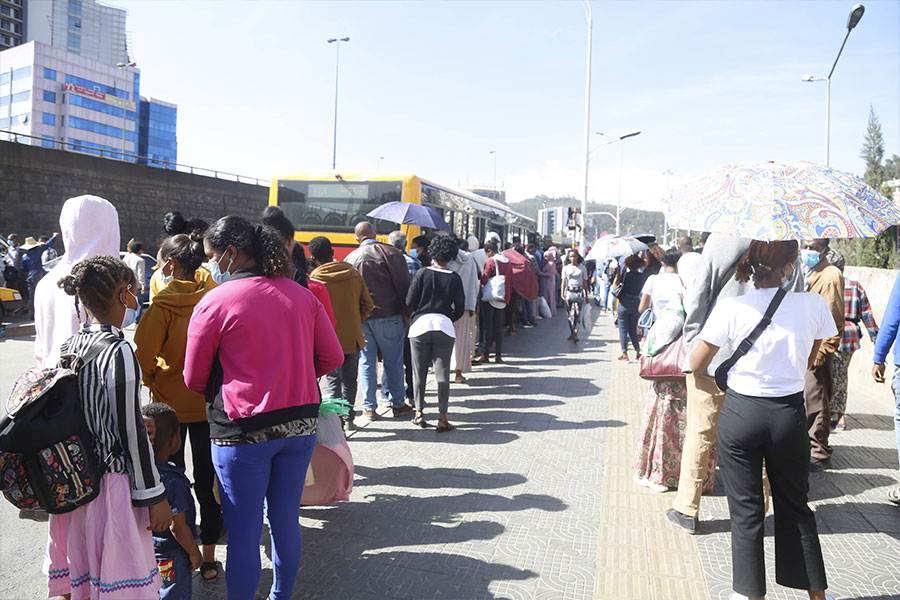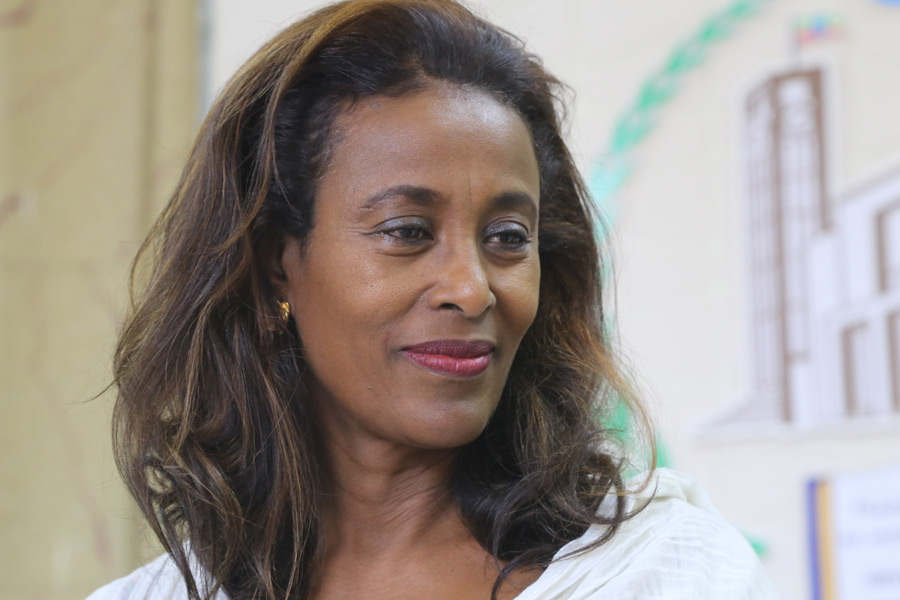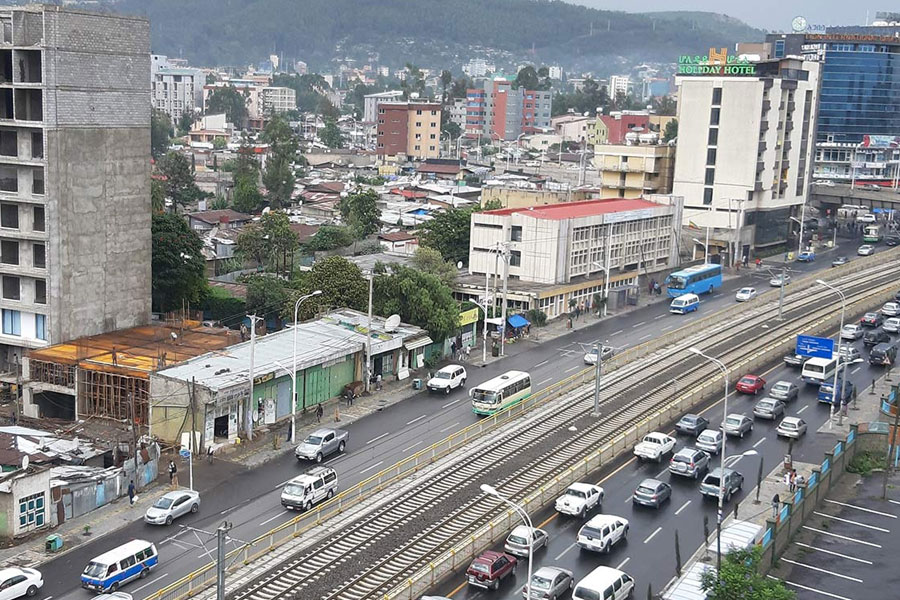
The 18-year-old Nuhamin Admasu seems indifferent about her school-leaving exam result. She scored 201 out of 600. The social science student claims she was not anxious even before seeing her results as she expected the outcome. She said her secondary school was eventful.
The pandemic that disrupted all routines hit while she was in 10th grade. Nuhamin describes the experience as bitter-sweet. Spending less time at school may have been fun, but the consequence was dire. Sliding to the next grade without a checkpoint after a long break did not seem taxing for her. Her parents decided to enrol her in a different school with the hopes she would get a quality education at a private school with a monthly fee of 2,000 Br.
The expectation to get better quality was cut short as the newly hired Maths teacher could not even speak proper Amharic or English language.
"It's just one of the many malfunctions," said Nuhamin.
The apparent miscommunication evident between the teacher and students scaled up to the school she preferred to keep anonymous, as Nuhamin and her peers found out the school leaving exam includes subject matters from lower grades a few months before the exam date. She claims that the school missed providing tutorial classes.
She turned her face to attending short-term courses following the appalling revelation, giving up on the route of formal education.
The wave of abominable results did not hit Nuhamin alone, as only 3.3pc of the students from nearly a million that took the exam managed to score above 50pc. The Ministry of Education revealed entrance points to the universities would not be lowered than half leaving 866,611 students, their parents and guardians dumbfounded.
The figure is less than a quarter of the 152,000 students who joined the 42 public universities as first-year students last year. There are 47 public universities under the Ministry with more than 61 billion Br allocated budget for the year, with an aggregated 33 billion Br covering recurrent expenditures.
The magnitude was far from anticipation by the officials in the education sector as the Minister of Education Berhanu Nega (Prof.) was quoted by the BBC describing the results as “shocking”.
He took the helm of the Ministry a couple of years ago, introducing a stringent exit and entrance examination process, taking the process up a notch and changing exam venues far from the familiar surroundings of students camping on the university campuses for a week, excluding the Tigray Regional State.
The move was made alongside Ethiopian National Educational Assessment & Examination Service, under Eshetu Kebede (PhD), with Authorities claiming it will address the exam leaks and rampant cheating observed in the past.
The institution is responsible for preparing and facilitating the national exams process. The Deputy General Manager, Yilkal Wondimeneh, firmly believes the drastic decline in the number of students meeting the minimum requirement to enter universities is a bitter but real fruit of the strict monitoring and regulation during the exam.
The Principal of Harmony Hill, Mulat Debesh, argues there are many factors that led to the shocking revelation besides that. He said the students would only go to school three days a week during the pandemic and mentioned that travelling and separation anxiety during the exam, leaving students in unfamiliar spaces, has its toll.
Established in 2013, Harmony Hill has 2,100 students enrolled, of which 480 are in high school. Although they are waiting for the official report from the Ministry, 29 students of the 69 examinees have scored points more than half, according to Mulat.
Berhanu absolutely disagrees with the psycho-effect arguments raised.
"They are adults, not kids," he said at a press conference.
Close to 39.2pc of the preparatory schools that had their students take the exam out of the 2,959 did not have a single student join the universities. Principals of the 1,161 schools have a flicker of hope in the midst of the fury that the figure may be lowered when the mismatched results with inaccurate data entry get addressed until Friday last week.
Experts such as Alemayehu Tekelemariam (PhD), lecturer for 30 years in the special needs and inclusive education department, make stakeholders, from the imperial regime to the previous administration, accountable for the "failed" education system.
He observes the lack of a homegrown education system has massively contributed to the failed system. The expert believes the deep-rooted problem started from adapting the westernised education system without thorough examination and associating political ideologies with the education system.
He did not shy away from mentioning the proliferation of 30 state-run higher education institutions in the past couple of decades focused on promoting quantity instead of quality education.
He published a study on the academic cheating prevalence 10 years ago, revealing that cheating during exams has become rampant across high schools in the capital. According to the study, up to 50pc of students admit to cheating in every exam, while close to 30pc engage in the act occasionally. The prevalence rate of cheating in 23 selected secondary schools in Addis Abeba is more than 80pc disclosed by students.
"That was the time to start control," he told Fortune.
According to the Ministry of Labour & Skills data, the urban youth unemployment rate has reached 11pc. The students, mere victims of the decades-long bent system and an attempt at a corrective measure that has put the cart before the horse, are left with few choices.
According to Amelework Ezekiel, communication director of the Ministry, after the capacity of universities is evaluated, students will have one more chance to attend the first year on probation and take a remedial exam.
Public universities across the country had the capacity to carry 380,000 students a couple of years ago. She said the remedial classes might also be given in selected private colleges and universities following the assessment.
The cutoff point for private institutions is not set yet as officials at the Education & Training Authority anticipate a flood of students eyeing alternatives. However, they are not about to waiver from their decision to ban issuing licenses to newly formed institutions and accreditation of new programs.
Given a month of notice, over 3,000 private colleges and universities were requested to report the number of enrolled students to the Authority, with only 90 complying. 30 private institutions reported their capacities before the due date are found to have students beyond their enrollment capacities.
The Authority is also responsible for controlling 40 TVET colleges. The officials aimed to filter the number of private colleges and universities nationwide.
The Inspection & Authentication Deputy under the Authority, Cherugeta Genene, is apprehensive over the massive number of students coming their way.
"We’re more worried about the quality," he said.
In line with only six boarding schools and one private school from the capital ensuring all their students pass, the long-term plan for the Ministry eyes on expanding boarding schools and focusing on producing qualified teachers, according to Amelework.
She disclosed that the Ministry plans to build 50 boarding and 50 primary schools in the next five years.
Dessie Special Boarding School in Amhara Regional State is where all 68 examinees attain the pass point, with 450 being the lowest score. Built by Tsedeke Yihune with over 29 million Br, the boarding school began enrolling students in 2018.
Students must score above 85pc in the eighth-grade regional examination to be considered, followed by an entrance exam.
The consequences of the northern war that had interrupted their studies for six months last year did not stop the students from performing their best, says Fiker Belay, the school principal.
The regional education Bureau allotted 19 million Br for the boarding school to 300 enrolled students for the current fiscal year.
The school hires university graduate teachers with above 3.5 GPAs. However, Fiker believes the 13,926 Br gross salary is unmatched, considering their contribution.
The expert Alemayehu agrees, recommending qualified teachers be supported with better salaries and fulfil their essential needs. Three months ago, academicians were on strike, claiming that they are underpaid and systematically undervalued for their efforts stressing the question of survival under dire economic conditions.
Joining universities, despite passing all these steps, cannot guarantee a degree, as experts at the Ministry introduced a directive compelling university students to take exit examinations before completing their undergraduate studies.
Close to 200,000 students will sit for the exit exam for the first time this year.
PUBLISHED ON
Feb 04,2023 [ VOL
23 , NO
1188]

Sunday with Eden | Nov 02,2024

Agenda | Feb 05,2022

Fortune News | Jan 05,2019

Radar | Feb 18,2023

Fortune News | Jun 17,2023

Fortune News | Dec 25,2021

Viewpoints | Jan 14,2023

Radar | Feb 04,2023

Viewpoints | Jun 17,2023

Fortune News | Jul 03,2021

Dec 22 , 2024 . By TIZITA SHEWAFERAW
Charged with transforming colossal state-owned enterprises into modern and competitiv...

Aug 18 , 2024 . By AKSAH ITALO
Although predictable Yonas Zerihun's job in the ride-hailing service is not immune to...

Jul 28 , 2024 . By TIZITA SHEWAFERAW
Unhabitual, perhaps too many, Samuel Gebreyohannes, 38, used to occasionally enjoy a couple of beers at breakfast. However, he recently swit...

Jul 13 , 2024 . By AKSAH ITALO
Investors who rely on tractors, trucks, and field vehicles for commuting, transporting commodities, and f...

Jun 28 , 2025
Meseret Damtie, the assertive auditor general, has never been shy about naming names...

Jun 21 , 2025
A well-worn adage says, “Budget is not destiny, but it is direction.” Examining t...

Jun 14 , 2025
Yet again, the Horn of Africa is bracing for trouble. A region already frayed by wars...

Jun 7 , 2025
Few promises shine brighter in Addis Abeba than the pledge of a roof for every family...